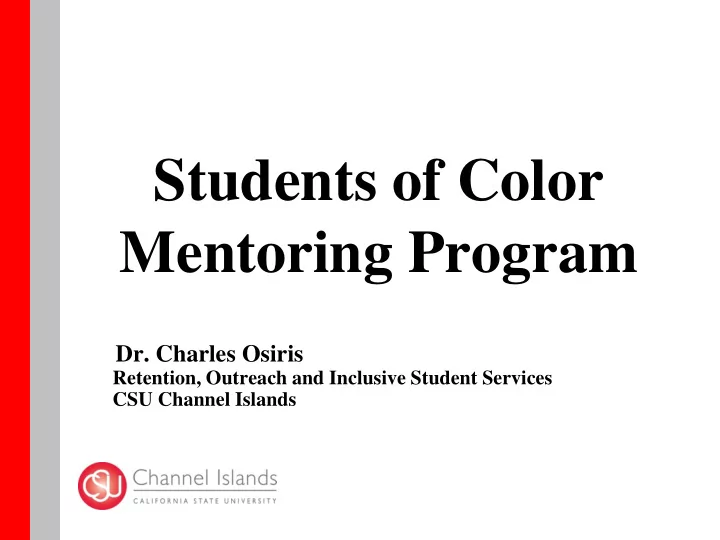

Students of Color Mentoring Program Dr. Charles Osiris Retention, Outreach and Inclusive Student Services CSU Channel Islands
Proposal Summary • Create a mentoring program for historically underrepresented groups (HUGS) at CSUCI • Mentoring by faculty and staff • Target groups: – First-time Full-time undergraduates – Men of Color (MOC) and Women of Color (WOC) • Out-of-classroom engagement with faculty • High impact learning practice • Aligns with Strategic initiatives 1.4, 1.7, 2.1, 2.5, 3.3, 3.6 • Contribute to GI 2025 goal to increase persistence and graduation rates for Historically Underrepresented Students
The Challenge • GI 2025 Graduation Goal of 40% • CSU -11.1% Six (6) Year Graduation Equity Gap • CI -9.6% Six (6) year Graduation Equity Gap • Female, Asian, Pell, 1 st Gen (-23.4) (2011-2013) • Female, African Am, Pell, 1 st Gen (-15.9) (2012-2013) • Male, African Am, Pell, 1 st Gen (-13.7) (2010-2013) • Male, Hispanic/Latino Pell, 1 st Gen (-11.2%) • MOC and WOC Sense of Belonging • Students of Color expressed extremely high interest in faculty/staff mentorship
Why Mentoring? • Decrease Equity Gaps for CI Men of Color • Increase a Sense of Belonging at CI • Faculty/staff mentorship encourages students to set and accomplish goals and are better equipped to overcome obstacles (Crisp and Cruz, 2009) • Connecting students to faculty/staff that have a similar background/identity linked to increased likelihood of success (Crisp and Cruz, 2009; Defreitas & Bravo, 2012) • Mentoring students of color increases the overall academic success and increases persistence (Brittain, Sy, & Stokes, 2009; Crisp and Cruz, 2009). • Strategic initiatives: 1.4, 1.7, 2.1, 2.5. 3.3, 3.6
Baseline Data • Spring 2019 Pilot Program • Limited faculty/staff mentoring for students of color • 24 Male student participants (status - 7s, 3j, 2s, 12f) • 19 volunteer faculty (9) and staff (10) mentors • 23 students (96%) self reported that the mentoring was extremely helpful academically, personal growth, career preparation and overall sense of community (belonging) • 7 (100%) of seniors wished this opportunity was available when they were entering CI • 11of the 12 (92%) FY students returned to CI this fall
Mentoring Program Goals • Support GI 2025 Goals: To increase overall student persistence and graduation rates • Engage with faculty/staff, build relationships • Build community/culture of success with That will help students of color thrive at CI • Increase student of color sense of belonging • Engage students of color in high impact learning practices during their tenure at CI
Program Metrics • Assess mentor and mentee satisfaction with mentoring program (monthly) • Collected data to assess progress toward strategic aligned initiatives (monthly and during each event or activity) • Student CI Sense of Belonging (periodic) • Student Academic / Social Engagement
Program Metrics • Assess and identify areas for improvement in program administration, staffing, workshops, student sense of belonging, relationship development and campus satisfaction (November/December/February) • Student Academic Progress (December)
Implementation timeline Fall 2019 September 2019 October 2019 November 2019 December 2019 Send invitation letter to Finalize matching process for Assess and identify areas for Mentoring workshop, identified students to recruit mentoring improvement in program prepare for end of semester for mentoring program administration, staffing, workshops, student sense of belonging and campus satisfaction Work on program outline Introduction conference First Success workshop for Finals prep and workshops for program formal meeting of mentees students Break activities/finals refresh and mentors (luncheon or (coffee, late night dinner, 4 th dinner) meal, etc.) Success workshop for Mentees and mentors Monthly satisfaction survey students discuss the development of distributed goals for the spring semester Monthly satisfaction survey Assess and identify areas for distributed improvement in program administration, staffing, workshops, student sense of belonging and campus satisfaction Request report on student academic progress
Implementation Timeline Spr 2020 January 2020 February 2020 March 2020 April 2020 May 2020 June 2020 Welcome back Assess and Mid-program End of year Finalize and Implement new luncheon/dinner for identify areas for evaluation to be celebration. publish the strategy based students and improvement in distributed to Graduation and results of the on feedback mentors. Evaluate program participants recommitment mid-program from previous goals from fall administration, for returning evaluation. evaluations. mentoring sessions staffing, students and Identify and and review goals for workshops, mentors. recruit new the spring semester student sense of incoming FTFT belonging and students upon campus admission/ utilize satisfaction as an enrollment tool. Monthly satisfaction Monthly Monthly Monthly Monthly survey distributed satisfaction survey satisfaction satisfaction satisfaction distributed survey survey distributed survey distributed distributed Request report on student academic progress
Program Budget Marketing Materials $800 Mentee support materials $1,000 Faculty/Staff Mentor Training $1,000 Peer Mentor /Mentee Introduction Conference Luncheon $3,600 Peer Mentor/Mentee Mid-Year Conference Luncheon $3,600 Mentoring Men/Women of Color Conference Webinars (2) $900 CSU Young Men of Color Consortium Meeting $7,500 Monthly Workshop Sessions (materials/refreshment) $2,000 Lunch vouchers for mentors to meet with mentees (6 per based on 60) $3,600 Lunch Vouchers for mentees that do not have a campus meal plan $2,400 Total request: $26,400
Risks • Failure to provide additional support/resources to the our most vulnerable student populations • The graduation equity gap may continue to rise without intentional interventions • Risk decreased student of color” sense of belonging” on campus • Students of color may continue to persist and graduate a lower rates than their counterparts • Addressing an expressed CI student need
Project Champions • Lead Division: Division of Student Affairs • Collaborating Division: Academic Affairs • Action Champion: Dr. Charles Osiris • Action Project Leads: Tracey Adams Johnson • Action Collaborators: Leo Sun, Natalie Johnson and participating CI faculty/staff
Questions?
Recommend
More recommend